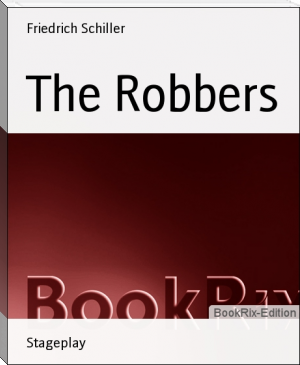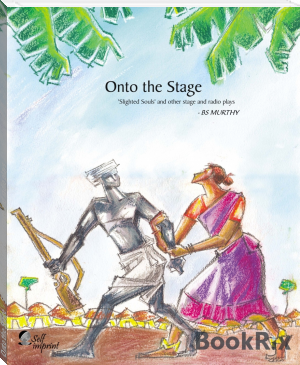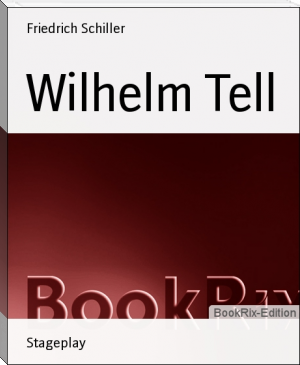The Robbers by Friedrich Schiller (large screen ebook reader .TXT) 📖

- Author: Friedrich Schiller
Book online «The Robbers by Friedrich Schiller (large screen ebook reader .TXT) 📖». Author Friedrich Schiller
FRANCIS. You see that I too have a spirit; but my spirit bears the sting of a scorpion. And then it was "the dry commonplace, the cold, the wooden Francis," and all the pretty little epithets which the contrast between us suggested to your fatherly affection, when he was sitting on your knee, or playfully patting your cheeks? "He would die, forsooth, within the boundaries of his own domain, moulder away, and soon be forgotten;" while the fame of this universal genius would spread from pole to pole! Ah! the cold, dull, wooden Francis thanks thee, heaven, with uplifted hands, that he bears no resemblance to his brother.
OLD M. Forgive me, my child! Reproach not thy unhappy father, whose fondest hopes have proved visionary. The merciful God who, through Charles, has sent these tears, will, through thee, my Francis, wipe them from my eyes!
FRANCIS. Yes, father, we will wipe them from your eyes. Your Francis will devote - his life to prolong yours. (Taking his hand with affected tenderness.) Your life is the oracle which I will especially consult on every undertaking - the mirror in which I will contemplate everything. No duty so sacred but I am ready to violate it for the preservation of your precious days. You believe me?
OLD M. Great are the duties which devolve on thee, my son - Heaven bless thee for what thou has been, and wilt be to me.
FRANCIS. Now tell me frankly, father. Should you not be a happy man, were you not obliged to call this son your own?
OLD M. In mercy, spare me! When the nurse first placed him in my arms, I held him up to Heaven and exclaimed, "Am I not truly blest?"
FRANCIS. So you said then. Now, have you found it so? You may envy the meanest peasant on your estate in this, that he is not the father of such a son. So long as you call him yours you are wretched. Your misery will grow with his years - it will lay you in your grave.
OLD M. Oh! he has already reduced me to the decrepitude of fourscore.
FRANCIS. Well, then - suppose you were to disown this son.
OLD M. (startled). Francis! Francis! what hast thou said!
FRANCIS. Is not your love for him the source of all your grief? Root out this love, and he concerns you no longer. But for this weak and reprehensible affection he would be dead to you; - as though he had never been born. It is not flesh and blood, it is the heart that makes us sons and fathers! Love him no more, and this monster ceases to be your son, though he were cut out of your flesh. He has till now been the apple of your eye; but if thine eye offend you, says Scripture, pluck it out. It is better to enter heaven with one eye than hell with two! "It is profitable for thee that one of thy members should perish, and not that thy whole body should be cast into hell." These are the words of the Bible!
OLD M. Wouldst thou have me curse my son?
FRANCIS. By no means, father. God forbid! But whom do you call your son? Him to whom you have given life, and who in return does his utmost to shorten yours.
OLD M. Oh, it is all too true! it is a judgment upon me. The Lord has chosen him as his instrument.
FRANCIS. See how filially your bosom child behaves. He destroys you by your own excess of paternal sympathy; murders you by means of the very love you bear him - has coiled round a father's heart to crush it. When you are laid beneath the turf he becomes lord of your possessions, and master of his own will. That barrier removed, and the torrent of his profligacy will rush on without control. Imagine yourself in his place. How often he must wish his father under ground - and how often, too, his brother - who so unmercifully impede the free course of his excesses. But call you this a requital of love? Is this filial gratitude for a father's tenderness? to sacrifice ten years of your life to the lewd pleasures of an hour? in one voluptuous moment to stake the honor of an ancestry which has stood unspotted through seven centuries? Do you call this a son? Answer? Do you call this your son?
OLD M. An undutiful son! Alas! but still my child! my child!
FRANCIS. A most amiable and precious child - whose constant study is to get rid of his father. Oh, that you could learn to see clearly! that the film might be removed from your eyes! But your indulgence must confirm him in his vices! your assistance tend to justify them. Doubtless you will avert the curse of Heaven from his head, but on your own, father - on yours - will it fall with twofold vengeance.
OLD M. Just! most just! Mine, mine be all the guilt!
FRANCIS. How many thousands who have drained the voluptuous bowl of pleasure to the dregs have been reclaimed by suffering! And is not the bodily pain which follows every excess a manifest declaration of the divine will! And shall man dare to thwart this by an impious exercise of affection? Shall a father ruin forever the pledge committed to his charge? Consider, father, if you abandon him for a time to the pressure of want will not he be obliged to turn from his wickedness and repent? Otherwise, untaught even in the great school of adversity, he must remain a confirmed reprobate? And then - woe to the father who by a culpable tenderness bath frustrated the ordinances of a higher wisdom! Well, father?
OLD M. I will write to him that I withdraw my protection.
FRANCIS. That would be wise and prudent.
OLD M. That he must never come into my sight again
FRANCIS. 'Twill have a most salutary effect.
OLD M. (tenderly). Until he reforms.
FRANCIS. Right, quite right. But suppose that he comes disguised in the hypocrite's mask, implores your compassion with tears, and wheedles from you a pardon, then quits you again on the morrow, and jests at your weakness in the arms of his harlot. No, my father! He will return of his own accord, when his conscience awakens him to repentance.
OLD M. I will write to him, on the spot, to that effect.
FRANCIS. Stop, father, one word more. Your just indignation might prompt reproaches too severe, words which might break his heart - and then - do you not think that your deigning to write with your own hand might be construed into an act of forgiveness? It would be better, I think, that you should commit the task to me?
OLD M. Do it, my son. Ah! it would, indeed, have broken my heart! Write to him that -
FRANCIS (quickly). That's agreed, then?
OLD M. Say that he has caused me a thousand bitter tears - a thousand sleepless nights - but, oh! do not drive my son to despair!
FRANCIS. Had you not better retire to rest, father? This affects you too strongly.
OLD M. Write to him that a father's heart - But I charge you, drive him not to despair. [Exit in sadness.]
FRANCIS (looking after him with a chuckle). Make thyself easy, old dotard! thou wilt never more press thy darling to thy bosom - there is a gulf between thee and him impassable as heaven is from hell. He was torn from thy arms before even thou couldst have dreamed it possible to decree the separation. Why, what a sorry bungler should I be had I not skill enough to pluck a son from a father's heart; ay, though he were riveted there with hooks of steel! I have drawn around thee a magic circle of curses which he cannot overleap. Good speed to thee, Master Francis. Papa's darling is disposed of - the course is clear. I must carefully pick up all the scraps of paper, for how easily might my handwriting be recognized. (He gathers the fragments of the letter.) And grief will soon make an end of the old gentleman. And as for her - I must tear this Charles from her heart, though half her life come with him.
No small cause have I for being dissatisfied with Dame Nature, and, by my honor, I will have amends! Why did I not crawl the first from my mother's womb? why not the only one? why has she heaped on me this burden of deformity? on me especially? Just as if she had spawned me from her refuse.* Why to me in particular this snub of the Laplander? these negro lips? these Hottentot eyes? On my word, the lady seems to have collected from all the race of mankind whatever was loathsome into a heap, and kneaded the mass into my particular person. Death and destruction! who empowered her to deny to me what she accorded to him? Could a man pay his court to her before he was born? or offend her before he existed? Why went she to work in such a partial spirit?
No! no! I do her injustice - she bestowed inventive faculty, and set us naked and helpless on the shore of this great ocean, the world - let those swim who can - the heavy** may sink. To me she gave naught else, and how to make the best use of my endowment is my present business. Men's natural rights are equal; claim is met by claim, effort by effort, and force by force - right is with the strongest - the limits of our power constitute our laws.
It is true there are certain organized conventions, which men have devised to keep up what is called the social compact. Honor! truly a very convenient coin, which those who know how to pass it may lay out with great advantage.*** Conscience! oh yes, a useful scarecrow to frighten sparrows away from cherry-trees; it is something like a fairly written bill of exchange with which your bankrupt merchant staves off the evil day.
* See Richard III., Act I, Sc. 1, line 17.
**Heavy is used in a double meaning; the German word is plump,
which Means lumpish clumsy awkward.
***So Falstaff, Hen. IV., Pt. I., Act V., Sc. 1, "Honor is a mere
scutcheon."
Well! these are all most admirable institutions for keeping fools in awe, and holding the mob underfoot, that the cunning may live the more at their ease. Rare institutions, doubtless. They are something like the fences my boors plant so closely to keep out the hares - yes I' faith, not a hare can trespass on the enclosure, but my lord claps spurs to his hunter, and away he gallops over the teeming harvest!
Poor hare! thou playest but a sorry part in this world's drama, but your worshipful lords must needs have hares!
*[This may help to illustrate a passage in Shakespeare which
puzzles the commentators - "Cupid is a good hare-finder." - Much ADO,
Act I., Sc. 1.
The hare, in Germany, is considered an emblem of abject submission
and cowardice. The word may also be rendered "Simpleton,"
"Sawney," or any other of the numerous epithets which imply a soft
 In literature a drama genre deserves your attention. Dramas are usually called plays. Every person is made up of two parts: good and evil. Due to life circumstances, the human reveals one or another side of his nature. In drama we can see the full range of emotions : it can be love, jealousy, hatred, fear, etc. The best drama books are full of dialogue. This type of drama is one of the oldest forms of storytelling and has existed almost since the beginning of humanity. Drama genre - these are events that involve a lot of people. People most often suffer in this genre, because they are selfish. People always think to themselves first, they want have a benefit.
In literature a drama genre deserves your attention. Dramas are usually called plays. Every person is made up of two parts: good and evil. Due to life circumstances, the human reveals one or another side of his nature. In drama we can see the full range of emotions : it can be love, jealousy, hatred, fear, etc. The best drama books are full of dialogue. This type of drama is one of the oldest forms of storytelling and has existed almost since the beginning of humanity. Drama genre - these are events that involve a lot of people. People most often suffer in this genre, because they are selfish. People always think to themselves first, they want have a benefit.




Comments (0)